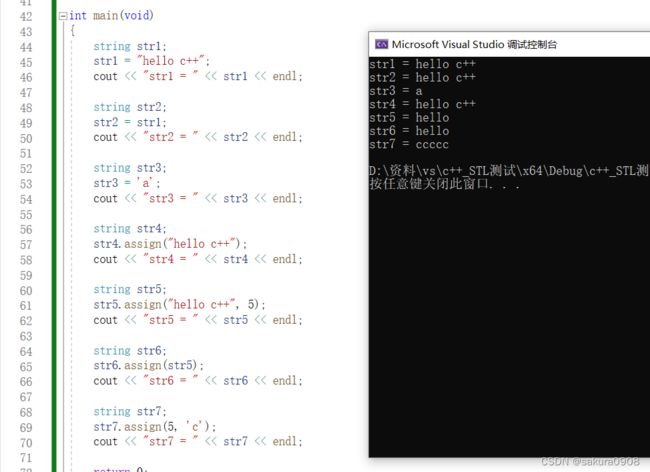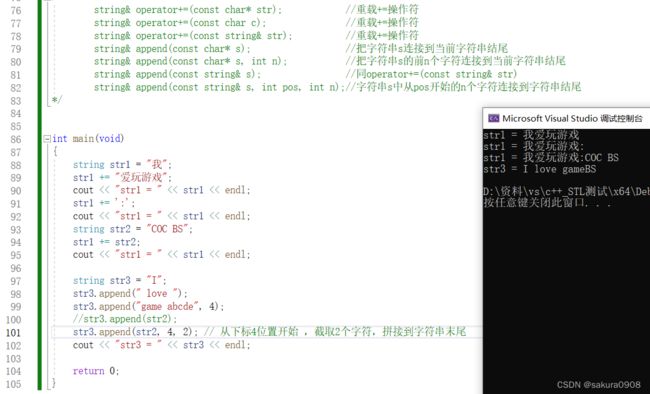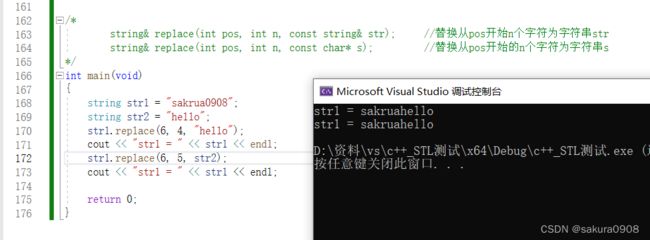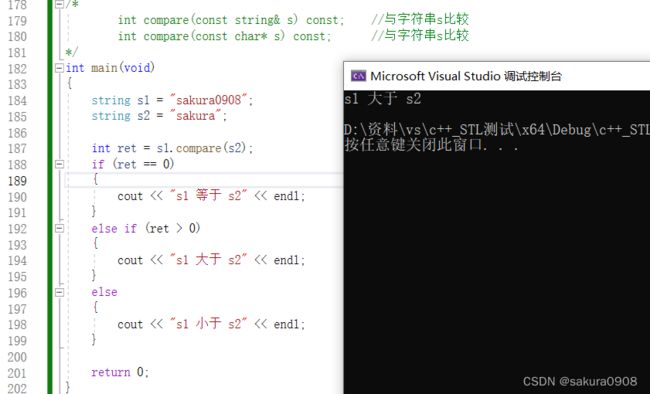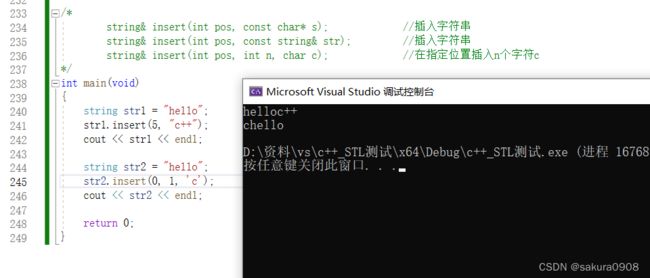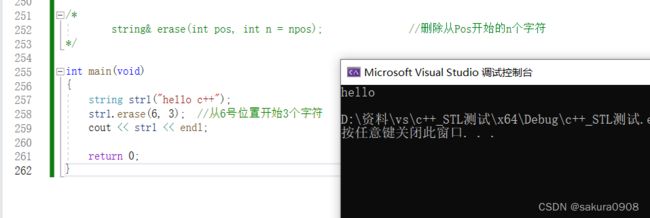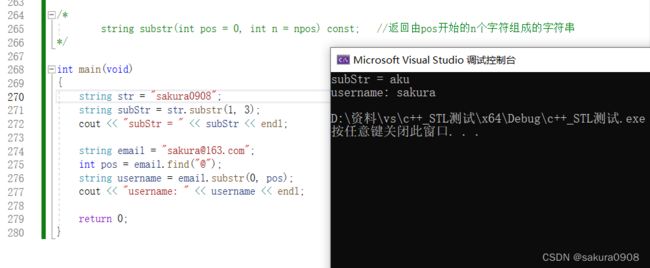【C++】STL的string容器介绍
目录
1、string容器
1.1声明一个c++字符串
1.2string和c字符数组的比较
1.3string类操作函数介绍
1.3.1赋值操作
1.3.2字符串拼接
1.3.3字符串查找
1.3.4字符串替换
1.3.5字符串比较
1.3.6字符存取
1.3.7字符串插入
1.3.8字符串删除
1.3.9子串获取
1、string容器
在c语言中,我们常使用char*的字符串,而在c++中,我们使用c++标准程序库中的string类,因为它和前者比较起来,不用担心内存是否足够、字符串长度等等,而且作为一个类出现,它集成的操作函数足以完成我们大多数情况下的需要。同时string类内部封装了很多成员函数,例如:查找find,拷贝copy,删除delete,替换replace,插入insert等等。
在我们编写的程序中使用string容器,需要包含头文件:
#include string和char*的区别:
- char*:是一个指针
- string:是一个类,类内部封装了char*,管理这个字符串是一个char*型的容器
1.1声明一个c++字符串
声明一个字符串变量很简单: string str;
这样我们就声明了一个字符串变量,但既然是一个类,就有构造函数和析构函数。上面的声明没有传入参数,所以就直接使用了string的默认的构造函数,这个函数所作的就是把str初始化为一个空字符串。string类的构造函数和析构函数如下:
string(); //创建一个空的字符串 例如: string str;
string(const char* s); //使用字符串s初始化
string(const string& str); //使用一个string对象初始化另一个string对象
string(int n, char c); //使用n个字符c初始化
~string(); //销毁所有字符,释放内存
案例代码测试:
#include
using namespace std;
#include
int main(void)
{
string str1; //创建空字符串,调用无参构造函数
cout << "str1 = " << str1 << endl;
//const char* str = "hello c++";
//string s2(str); //把c_string转换成了string
string str2("hello c++");
cout << "str2 = " << str2 << endl;
string str3(str2); //调用拷贝构造函数
cout << "str3 = " << str3 << endl;
string str4(10, 'c');
cout << "str4 = " << str4 << endl;
return 0;
} 1.2string和c字符数组的比较
string串要取得其中某一个字符,和传统的C字符串一样,可以用s[i]的方式取得。比较不一样的是如果s有三个字符,传统C的字符串的s[3]是’\0’字符,但是C++的string则是只到s[2]这个字符而已。
1、C风格字符串
- 用”“括起来的字符串常量,C++中的字符串常量由编译器在末尾添加一个空字符;
- 末尾添加了‘\0’的字符数组,C风格字符串的末尾必须有一个’\0’。
2、C字符数组及其与string串的区别
- char ch[ ]={‘C’, ‘+’, ‘+’}; //末尾无NULL
- char ch[ ]={‘C’, ‘+’, ‘+’, ‘\0’}; //末尾显式添加NULL
- char ch[ ]=”C++”; //末尾自动添加NULL字符 若[ ]内数字大于实际字符数,将实际字符存入数组,其余位置全部为’\0’。
| 操作 |
string |
字符数组 |
| 声明字符串 |
string str; |
char str[1024]; |
| 获得第i个字符 |
str[i]; |
str[i]; |
| 字符串长度 |
str.length();str.size() |
strlen(str); |
| 读取一行 |
getline(cin,str); |
gets(str); |
| 设成某字符串 |
str="c++"; |
strcpy(str,"cyuyan"); |
| 字符串相加 |
str += "hello"; |
strcat(str,"hello"); |
| 字符串比较 |
str == "c++" |
strcmp(str,"cyuyan"); |
| ... |
... |
... |
1.3string类操作函数介绍
1.3.1赋值操作
功能描述:给string字符串进行赋值
string& operator=(const char* s); //char*类型字符串 赋值给当前的字符串
string& operator=(const string &s); //把字符串s赋给当前的字符串
string& operator=(char c); //字符赋值给当前的字符串
string& assign(const char *s); //把字符串s赋给当前的字符串
string& assign(const char *s, int n); //把字符串s的前n个字符赋给当前的字符串
string& assign(const string &s); //把字符串s赋给当前字符串
string& assign(int n, char c); //用n个字符c赋给当前字符串
案例代码测试:
int main(void)
{
string str1;
str1 = "hello c++";
cout << "str1 = " << str1 << endl;
string str2;
str2 = str1;
cout << "str2 = " << str2 << endl;
string str3;
str3 = 'a';
cout << "str3 = " << str3 << endl;
string str4;
str4.assign("hello c++");
cout << "str4 = " << str4 << endl;
string str5;
str5.assign("hello c++", 5);
cout << "str5 = " << str5 << endl;
string str6;
str6.assign(str5);
cout << "str6 = " << str6 << endl;
string str7;
str7.assign(5, 'c');
cout << "str7 = " << str7 << endl;
return 0;
}1.3.2字符串拼接
功能描述:实现在字符串末尾拼接字符串
string& operator+=(const char c); //重载+=操作符
string& operator+=(const string& str); //重载+=操作符
string& append(const char *s); //把字符串s连接到当前字符串结尾
string& append(const char *s, int n); //把字符串s的前n个字符连接到当前字符串结尾
string& append(const string &s); //同operator+=(const string& str)
string& append(const string &s, int pos, int n);//字符串s中从pos开始的n个字符连接到字符串结尾
案例代码测试:
int main(void)
{
string str1;
str1 = "hello c++";
cout << "str1 = " << str1 << endl;
string str2;
str2 = str1;
cout << "str2 = " << str2 << endl;
string str3;
str3 = 'a';
cout << "str3 = " << str3 << endl;
string str4;
str4.assign("hello c++");
cout << "str4 = " << str4 << endl;
string str5;
str5.assign("hello c++", 5);
cout << "str5 = " << str5 << endl;
string str6;
str6.assign(str5);
cout << "str6 = " << str6 << endl;
string str7;
str7.assign(5, 'c');
cout << "str7 = " << str7 << endl;
return 0;
}1.3.3字符串查找
功能描述:查找指定字符串是否存在
int find(const string& str, int pos = 0) const; //查找str第一次出现位置,从pos开始查找
int find(const char* s, int pos = 0) const; //查找s第一次出现位置,从pos开始查找
int find(const char* s, int pos, int n) const; //从pos位置查找s的前n个字符第一次位置
int find(const char c, int pos = 0) const; //查找字符c第一次出现位置
int rfind(const string& str, int pos = npos) const; //查找str最后一次位置,从pos开始查找
int rfind(const char* s, int pos = npos) const; //查找s最后一次出现位置,从pos开始查找
int rfind(const char* s, int pos, int n) const; //从pos查找s的前n个字符最后一次位置
int rfind(const char c, int pos = 0) const; //查找字符c最后一次出现位置
案例代码测试:
int main(void)
{
string str1("sakura0908");
string str2 = "0908";
int ret = str1.find(str2, 0);
if (ret == -1)
{
cout << "没有找到目标字符串" << endl;
}
else
{
cout << "[" << ret << "]" << "找到目标字符串" << endl;
}
ret = str1.find("sakura", 0);
if (ret == -1)
{
cout << "没有找到目标字符串" << endl;
}
else
{
cout << "[" << ret << "]" << "找到目标字符串" << endl;
}
ret = str1.find("0908", 0, 1);
if (ret == -1)
{
cout << "没有找到目标字符串" << endl;
}
else
{
cout << "[" << ret << "]" << "找到目标字符串" << endl;
}
ret = str1.find("s", 0);
if (ret == -1)
{
cout << "没有找到目标字符串" << endl;
}
else
{
cout << "[" << ret << "]" << "找到目标字符串" << endl;
}
return 0;
}而rfind和find的效果是差不多的,这里不提供测试代码,区别在于find查找是从左往右,rfind查找是从右往左
find函数找到字符串后返回查找的第一个字符位置,找不到则返回-1
1.3.4字符串替换
功能描述:在指定的位置替换字符串
string& replace(int pos, int n, const string& str); //替换从pos开始n个字符为字符串str
string& replace(int pos, int n,const char* s); //替换从pos开始的n个字符为字符串s
案例代码测试:
int main(void)
{
string str1 = "sakrua0908";
string str2 = "hello";
str1.replace(6, 4, "hello");
cout << "str1 = " << str1 << endl;
str1.replace(6, 5, str2);
cout << "str1 = " << str1 << endl;
return 0;
}replay在替换的时候,要指定从哪个位置起,多少个字符替换成什么样的字符串
1.3.5字符串比较
功能描述:字符串之间的比较
比较方式:字符串比较是按字符的ASCII码进行对比
= 返回 0
> 返回 1
< 返回 -1
int compare(const string &s) const; //与字符串s比较
int compare(const char *s) const; //与字符串s比较
案例代码测试:
int main(void)
{
string s1 = "sakura0908";
string s2 = "sakura";
int ret = s1.compare(s2);
if (ret == 0)
{
cout << "s1 等于 s2" << endl;
}
else if (ret > 0)
{
cout << "s1 大于 s2" << endl;
}
else
{
cout << "s1 小于 s2" << endl;
}
return 0;
}1.3.6字符存取
功能描述:单个字符存取
char& operator[](int n); //通过[]方式取字符
char& at(int n); //通过at方法获取字符
案例代码测试:
int main(void)
{
string str = "hello c++";
for (int i = 0; i < str.size(); i++)
{
cout << str[i] << " ";
}
cout << endl;
for (int i = 0; i < str.size(); i++)
{
cout << str.at(i) << " ";
}
cout << endl;
//字符修改
str[0] = 'a';
str.at(1) = 'a';
cout << str << endl;
return 0;
}1.3.7字符串插入
功能描述:对string字符串进行插入字符操作
string& insert(int pos, const char* s); //插入字符串
string& insert(int pos, const string& str); //插入字符串
string& insert(int pos, int n, char c); //在指定位置插入n个字符c
案例代码测试:
int main(void)
{
string str1 = "hello";
str1.insert(5, "c++");
cout << str1 << endl;
string str2 = "hello";
str2.insert(0, 1, 'c');
cout << str2 << endl;
return 0;
}1.3.8字符串删除
功能描述:对string字符串进行删除字符操作
string& erase(int pos, int n = npos); //删除从Pos开始的n个字符
案例代码测试:
int main(void)
{
string str1("hello c++");
str1.erase(6, 3); //从6号位置开始3个字符
cout << str1 << endl;
return 0;
}要记住:插入和删除的起始下标都是从0开始(利用数组的首元素下标为0记忆)
1.3.9子串获取
功能描述:从字符串中获取想要的子串
string substr(int pos = 0, int n = npos) const; //返回由pos开始的n个字符组成的字符串
案例代码测试:
int main(void)
{
string str = "sakura0908";
string subStr = str.substr(1, 3);
cout << "subStr = " << subStr << endl;
string email = "[email protected]";
int pos = email.find("@");
string username = email.substr(0, pos);
cout << "username: " << username << endl;
return 0;
}这里只提出部分string的操作函数,还有其函数重载版本和其他函数并没有提出,有兴趣的读取可以自行探索。
例如:clear()删除全部字符,size(),length()返回字符数量,capacity()返回重新分配之前的字符容量,reserve()保留一定量内存以容纳一定数量的字符,data()将内容以字符数组形式返回 无’\0’,begin() end()提供类似STL的迭代器支持,front()返回首元素,back()返回末尾元素等等

